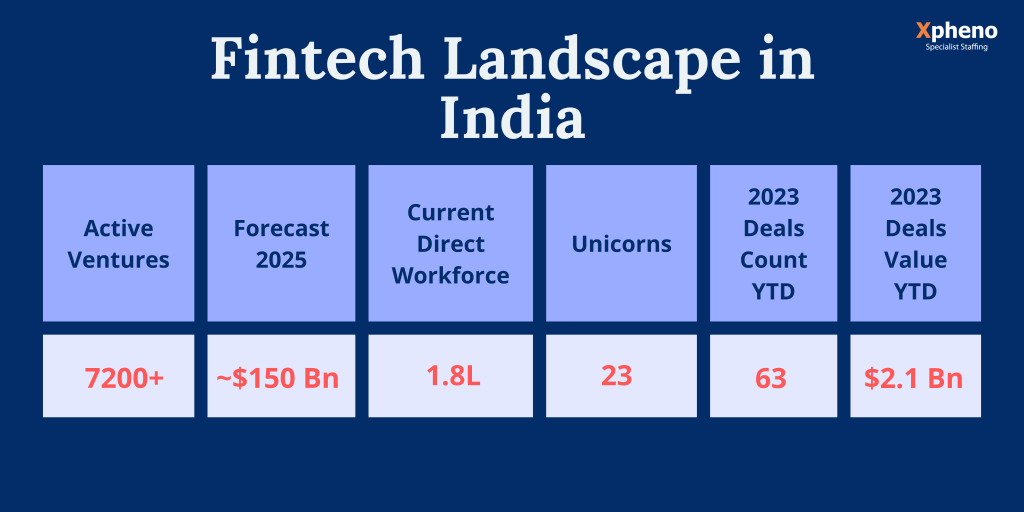Indian Fintech Companies and their Massive Demand for Talent
Fintech has redefined the realm of finance, reshaping the way we conduct daily transactions, manage savings, and engage in investment activities. India has emerged as a frontrunner in the global fintech race, boasting the highest fintech adoption rate of 87% as per the Economic Survey 2023. This makes India a thriving marketplace for fintech startups and talent seeking growth opportunities.
The 7200+ active fintech companies in India and new emerging fintech models are reshaping the market opportunity in the Indian BFSI sector. Furthermore, these enterprises are on a hiring spree to bridge the talent gap created by ever-advancing technologies (more on that later). Let’s delve into the world of Indian fintech and the lucrative and promising career opportunities you can explore:
Table of Contents
The Indian Fintech Ecosystem
In Q1 2023, Indian fintech companies secured the highest funding amount in India at $1.28 Bn. It also secured the second-highest funding among all startup sectors, capturing a notable 14% share of global funding in 2022. It’s no wonder that India stands as the world’s third-largest fintech ecosystem after US and China, boasting the highest Compound Annual Growth Rate (CAGR) of 20% over CY 2019 – 2022, according to this BCG report.
Needless to say, Indian Fintech companies have created a significant impact on the Indian economy through their fast-paced innovation and consumer-centric focus. It’s playing a key role in promoting financial inclusion and driving the credit cycle, thanks to initiatives like Pradhan Mantri Jan Dhan Yojana and Post Payment banks that encourage digital payments and net banking. Supported by government schemes, the Indian fintech ecosystem has flourished, currently boasting 23 unicorns out of a total of 106 in India.
Additionally, various entities such as Non-Banking Financial Corporations (NBFCs), Housing Finance Companies (HFCs), and Micro Finance Institutions (MFIs) are also complementing and collaborating with fintechs. Government initiatives, fintech innovation, and collaboration with traditional financial institutions have collectively propelled India’s financial landscape forward.
This has led to greater accessibility, improved efficiency, and enhanced economic growth, benefiting the country as a whole. In fact, fintech enterprises delivering financial services to the Indian masses hold significant importance for India’s ambitious mission to become a US$ 5 trillion economy.
Let’s dive into the vibrant world of Indian Fintech and its major segments:
Paytech
Paytech includes mobile money systems and fintech payment portals. It facilitates quick payments and micropayments for consumers and improves revenue channels for businesses. Fintech payment Unicorns and Soonicorns like Razorpay, Billdesk, and Stripe offer SaaS solutions as payment portals for businesses. On the other hand, companies like Paytm (a decacorn) Bharat Pe , Mobikwik and PhonePe provide e-wallet services to consumers for making faster payments.
The Unified Payments Interface (UPI) has played a major role in revolutionising payments in India, accounting for 73% of all digital payments by FY26. According to NPCI, India witnessed 9415 million transactions amounting to Rs. 14.89 Tn (US$180 Bn) in May 2023 alone.
India’s digital payments system has gained global recognition, with Immediate Payment Service (IMPS) being the only system ranked at level five in the Faster Payments Innovation Index. These developments have reshaped India’s payment landscape, empowering individuals and businesses to transact seamlessly, drive financial inclusion, and contribute to economic growth.
UI/UX design, Cloud Computing skills, AI/ML architecture and Cybersecurity are technology domains that encompass multiple job roles and are crucial for the digital payment space. As the fintech market continues to grow, it’s an opportunity for tech and non-tech talent to explore (Stay tuned for more on that).
Lending Tech
Lending-tech platforms in India offer several models for funding SMEs and individuals, providing personal and business loans at accessible rates and terms. They are also leveraging their tech stack as credit aggregators to serve other lending Fintechs, NBFCs, and Banks. They help them expedite market entry and ensure compliance with the current lending regulations.
The State of Indian Fintech report for Q1 2023 by INC24 highlights that lending technology emerged as the dominant subsector in terms of venture capital investments in 2023. It recorded the highest share in both the total value and number of deals compared to other fintech subsectors.
Major lending-tech models
Lending Tech includes various B2B and B2C lending models. Lendingkart and Pine Labs are some major Indian Fintechs that offer capital loans to small to medium-sized businesses. Companies like Finflux and Fino Paytech provide technology solutions for Banks, Government, and Insurance companies for needs of loan origination, loan management, financial accounting, etc.
An increasingly popular lending tech service model is the Buy Now Pay Later model which allows people to get products and services on a short-term, interest-free, and hassle-free loan. Startups like Mobikwik and Paytm offer personal loans in the form of digital lending wallets.
Peer-to-peer lending is another lending-tech model enabled by fintech that allows businesses and people to get loans directly from other investors. Faircent is India’s largest and the first RBI-registered digital lending platform offering peer-to-peer lending services. Jaikisan and FIA Global are some of the Indian fintech startups that are actively working to enable financial inclusion in rural and semi-urban regions through digital financial services and credit assistance.
Timely innovation is crucial for the sector’s growth. Startups are using big data and AI-ML algorithms to assess creditworthiness. All in all, the lending technology stack has four layers: Acquisition & Underwriting, Servicing, Back Office Enablement, and Collections. To put it quite plainly, these layers involve acquiring customers, managing loans, automating processes, and providing debt collection services in the fintech lending industry. Lending tech companies are searching for tech talent skilled in niche technologies to help them create cloud-based SaaS solutions based on their lending focus.
Insurance
The impact of fintech disruption is making waves in the insurance sector too. According to the IBEF report, it’s predicted that the investment corpus in the Indian insurance industry could skyrocket to US$ 1 trillion by 2025.
The digital revolution is bringing convenience to both insurance companies and individuals by automating processes. Now policyholders can effortlessly check their policy statements and file claims with just a tap of their finger. Excitingly, as per the IBEF report, India’s insurance market is expected to reach a remarkable US$ 250 billion by 2025, showcasing the tremendous growth potential. Policy Bazaar, Akco, and Digit Insurance are the Unicorns in the Indian Insurtech space.
Investment-tech
Fintech has brought remarkable convenience to stock trading and data analysis, making it more accessible than ever before. With the power of AI technology, even those who are new to investing find it less intimidating.
Fintech companies offering investment and trading solutions have soared in popularity in recent years, primarily because they provide users with easy access to industry trends and patterns. This empowers individuals to make well-informed decisions when it comes to trading and investing. Despite mutual fund penetration currently standing at a modest 5-6%, there are significant untapped growth opportunities in the market.
According to Goldman Sachs, investors are showing great interest in India’s stock market, and it could surpass the United Kingdom and become the world’s fifth-largest stock market by 2024, with a valuation exceeding US$ 5 trillion. This reflects the growing confidence in India’s investment market and highlights its potential for remarkable growth. Groww, Zerodha, MSwipe, CRED, Upstox, Marquee Equity, Stockal, and Wint Wealth are some of the major Indian Investment Tech firms in India garnering the highest funding.
Neo-Banking
The banking industry is at the forefront of adopting fintech solutions to offer advanced services to its customers. Fintech companies have introduced innovative and secure solutions that allow account opening, loan applications, and bill payments to be done online. The EY 2021 NextWave Global Consumer Banking Survey reveals that FinTechs and neo-banks are gaining traction as consumers’ primary financial relationships.
Interestingly, consumers are particularly drawn to fintech solutions for the crucial aspect of safeguarding their personal data, whereas earlier, traditional banks enjoyed a trust advantage. Additionally, some super apps seek partnerships with banks to access banking licenses and fulfill regulatory requirements.
As per the Economic Survey 2022-23, there has been a consistent rise in the number of neo-banking platforms and global investments in the neo-banking segment. Neo-banks, operating within the broader financial landscape, offer specialized services traditionally associated with banks and payment providers. Last year, Open Money NeoBank became India’s 100th Unicorn. Jupiter, Niyo, and Finin Neobank are some of the biggest online-based digital banking platforms in India.
Future of Fintech in India
Fintech in India continues to expand its reach into various sectors, creating new opportunities along the way. Crowdfunding and wealth management are such domains where Indian Fintech startups are taking innovative approaches to increase the participation of Indian demographics.
Another notable example is the emergence of crypto startups that are driving the shift towards a decentralized web. The Web,3, Blockchain and Crypto industry has a longer horizon for maturity, but they continue to invest in specialist talent for their long-term plans.
For these emerging Fintechs, finding a balance between “fin” and “tech” is key. While acquiring customers and driving growth are important, understanding banking revenue streams and focusing on profitable operations from the beginning are also crucial for success. Consequently, there is a growing demand for tech and non-tech talent in these fintech startups.
However, fintech companies are facing challenges in attracting and retaining specialists to ensure smooth operations and drive ongoing innovation. Overcoming this obstacle is essential for Indian Fintech startups to thrive in the industry.
Jobs demand in Fintech
It’s no surprise that Indian fintech startups have great employment opportunities for tech and non-tech talent. Indian fintech ventures collectively employ a 1.8 Lac direct workforce. Moreover, the indirect workforce which includes Sales, Inside Sales, Customer Service, is estimated 1.5 times the direct workforce.
Fintech’s disruptive nature demands professionals who seek to leverage their skills in a dynamic and innovative environment.
As a result, there is a noticeable movement of talent from traditional banking and other industries to fintech. Professionals are drawn to the opportunities for great career prospects and the potential for impactful contributions in reshaping the financial landscape.
In terms of specific technical skills, fintech companies are actively seeking professionals with expertise in:
- Full-stack development
- Backend and Frontend Development
- Data Engineering
- Data Analytics
- Software Development Engineering in Test (SDET)
- Mobile app development (iOS, Android)
- Engineering Management
These skills are essential for developing and maintaining fintech platforms and applications that drive the industry’s growth.
A notable shift of expertise from the broader BFSI (Banking, Financial Services, and Insurance) sector into fintech is the transition from traditional sales in banking to fintech inside sales and support functions. While “feet on the street” sales teams were once prominent, fintech companies are now focusing on building efficient back-office operations to support their sales efforts.
Skilled talent stays to be the biggest factor in maintaining sustained, robust growth for Indian Fintechs. Yet, in the dynamic Fintech job market, candidates have numerous options available to them, making it increasingly challenging to attract and retain top talent within an organization. This is where Xpheno comes in.
We offer staffing solutions, connecting skilled professionals to scaling enterprises, and forging impactful relationships. If you are looking for reliable partners to access industry-level tech talent or solve your sales staffing problems, drop us a message. We’re happy to help!
Bottomline
Fintech’s fast-paced innovations and exciting growth have made it a great choice for ambitious individuals seeking new challenges and career growth.
Fintech innovations are making various financial processes increasingly efficient and user-friendly. This trend is bound to fulfill the growing financial needs of Indian consumers, leading to greater financial inclusivity in India. It also creates a vast scope for professionals in the fintech industry, offering them opportunities to explore their creativity, drive innovation, and advance their careers in this dynamic field.



